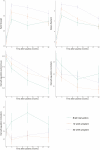Mechanisms of Action in a Behavioral Weight-Management Program: Latent Growth Curve Analysis
- PMID: 33821937
- PMCID: PMC8691398
- DOI: 10.1093/abm/kaab019
Mechanisms of Action in a Behavioral Weight-Management Program: Latent Growth Curve Analysis
Abstract
Background: A greater understanding of the mechanisms of action of weight-management interventions is needed to inform the design of effective interventions.
Purpose: To investigate whether dietary restraint, habit strength, or diet self-regulation mediated the impact of a behavioral weight-management intervention on weight loss and weight loss maintenance.
Methods: Latent growth curve analysis (LGCA) was conducted on trial data in which adults (N = 1,267) with a body mass index (BMI) ≥28 kg/m2 were randomized to either a brief intervention (booklet on losing weight), a 12 week weight-management program or the same program for 52 weeks. LGCA estimated the trajectory of the variables over four time points (baseline and 3, 12 and 24 months) to assess whether potential mechanisms of action mediated the impact of the weight-management program on BMI.
Results: Participants randomized to the 12 and 52 week programs had a significantly greater decrease in BMI than the brief intervention. This direct effect became nonsignificant when dietary restraint, habit strength, and autonomous diet self-regulation were controlled for. The total indirect effect was significant for both the 12 (estimate = -1.33, standard error [SE] = 0.41, p = .001) and 52 week (estimate = -2.13, SE = 0.52, p < .001) program. Only the individual indirect effect for dietary restraint was significant for the 12 week intervention, whereas all three indirect effects were significant for the 52 week intervention.
Conclusions: Behavior change techniques that target dietary restraint, habit strength, and autonomous diet self-regulation should be considered when designing weight loss and weight loss maintenance interventions. Longer interventions may need to target both deliberative and automatic control processes to support successful weight management.
Keywords: Habit; Mediation; Restraint; Self-regulation; Weight management.
© The Author(s) 2021. Published by Oxford University Press on behalf of the Society of Behavioral Medicine.
Figures
References
-
- National Institute of Diabetes and Digestive and Kidney Diseases. Overweight & obesity statistics. Available at https://www.niddk.nih.gov/health-information/health-statistics/overweigh.... Accessibility verified February 15, 2020.
-
- NHS Digital. Statistics on obesity, physical activity and diet. Available at https://digital.nhs.uk/data-and-information/publications/statistical/sta.... Accessibility verified Febraury 15, 2020.
-
- Stegenga H, Haines A, Jones K, Wilding J; Guideline Development Group . Identification, assessment, and management of overweight and obesity: Summary of updated NICE guidance. BMJ. 2014;349:g6608. - PubMed
-
- LeBlanc ES, Patnode CD, Webber EM, Redmond N, Rushkin M, O’Connor EA. Behavioral and pharmacotherapy weight loss interventions to prevent obesity-related morbidity and mortality in adults: Updated evidence report and systematic review for the US Preventive Services Task Force. JAMA. 2018;320:1172–1191. - PubMed
Publication types
MeSH terms
Grants and funding
LinkOut - more resources
Full Text Sources
Other Literature Sources
Medical





